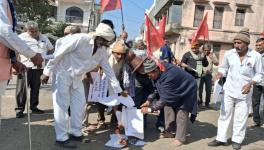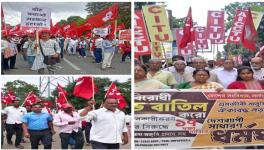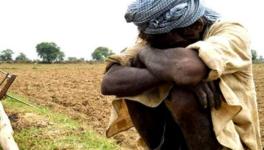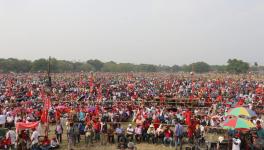Farmers Celebrate Hul Kranti Diwas at Protest Sites Across the Country
Representational use only.
Farmers’ organisations on Wednesday observed the Hul Kranti Diwas – a famous Santhal rebellion against the atrocious zamindari system in 1855 – in remembrance of martyrs in a struggle also known as first armed rebellion against the British rule. In the national capital, farmers from Odisha joined farmers’ protesting at Delhi’s north-west Singhu Border against the three central Farm Laws and for legal guarantee of a minimum support price (MSP).
Addressing the audience, Pratap Pradhan, who had travelled from Odisha to attend the celebrations, said that their group covered about 1,500 kilometres only to show that the ideologues of the government were simply wrong when they suggest the movement is limited to only two states. "The Santhal uprising against the oppressive British Rule was for reclaiming our land. The farmers of the country are fighting the same battle again after 155 years, in an independent country,” he added.
Speaking to Newsclick over the phone, Jagmohan Singh, president, Bharatiya Kisan Union (Dakaunda) said that the importance of the historic rebellion stood for current struggle. The Santhals fought the British army for a year, losing about 15,000 people. “The lesson is of how we conduct a long struggle with a mighty enemy. The tribals were fighting against atrocious land revenue systems. Today, they are fighting against corporate plunder aimed at their forests, land and rivers,” he said.
Speaking of the story of the famous rebellion, Ashok Dhawale, president, All India Kisan Sabha, said that two years prior to the 1857 rebellion, "thousands of Adivasis started a war for liberation against the oppressive rule of the East India Company and also the zamindars and mahajans. It was a rebellion against the oppressive new land revenue system introduced by the Company rule in 1793 which replaced the egalitarian economic and political systems followed by the Adivasis in the region, with an exploitative system of zamindari and mahajani. Zamindars, promoted by the Company rule, acting as parasites appropriated lands, destroyed forests which were the basis of livelihoods of Santhals. The new system gradually forced Santhals to borrow money from mahajans who charged usurious rates of interest pushing them into a debt trap and making them perpetually indebted to their oppressors.”
“The high land taxes, which were arbitrarily fixed, and indebtedness due to the usurious interest rates, resulted in them losing their land. They were dispossessed of their means of livelihood and converted to bonded labourers. Traditional forest rights were also undermined. Some of the Adivasis had to abandon agriculture altogether and seek work under the railways projects undertaken by the Company. This loot and exploitation along with the demolition of traditional political and economic structures and environment in the region of today’s Santhal Pargana, areas falling within Jharkhand, Bihar and West Bengal today, was not acceptable to the people. To fight against this systemic exploitation and loot and the indignity unleashed by the parasitic classes, the Santhals decided to organise themselves under the leadership of the Murmu brothers and sisters," he added,
Dhawale said that the struggle forced the British government to enact the Chota Nagpur Tenancy Act, 1908 and the Santhal Pargana Tenancy Act in 1876, guaranteeing the Adivasis rights over forests. When asked how the farmers’ union came with up the decision to observe to the day, he said: "The Hul anniversary this year also comes at a time when crores of farmers from all across the country are agitating against the anti-farmer, anti-worker laws enacted by the present BJP government."
"Farmers sitting at Delhi’s borders for more seven months facing relentless repression know that these laws will facilitate corporate loot of agriculture and force millions to lose their land and livelihoods. They will not fall for false promises made by the Prime Minister Narendra Modi and the BJP government of 'doubling their income' and development," he added.
Confrontation at Ghazipur Border
Farmers’ at the Ghazipur protest site alleged that activists from the Bharatiya Janata Party provoked protesters while welcoming a local leader by beating drums near the stage and raising provocative statements. Jagtar Singh Bajwa, core committee member of the Samyukta Kisan Morcha Ghazipur Border, in a press statement, said: "On the pretext of welcoming a BJP leader Amit Valmiki, several BJP-RSS workers and supporters came to the Ghazipur Border UP Gate protest site today, and went close to the morcha stage. They also raised slogans against the farmers' movement. They raised slogans against protesting farmers calling them 'gaddar', 'anti national', 'khalistanis' and 'terrorists'.
Bajwa said that there was no reason to welcome the BJP leader at this location, and that it was done only to "instigate a clash" with the protesting farmers, police in tow, in a time-testing BJP-RSS tactic. "They moved aggressively towards the stage, threatened to cross over the divider. Farmers objected to the same and confronted them with black flags. Farmers insisted on the BJP workers leaving the place. Police remained mute spectators throughout. In the ensuing clash, at least five farmers were injured. The BJP is clearly trying to bring in discord and disturbance in some way or the other, including dividing people on caste and religious lines," he added.
Get the latest reports & analysis with people's perspective on Protests, movements & deep analytical videos, discussions of the current affairs in your Telegram app. Subscribe to NewsClick's Telegram channel & get Real-Time updates on stories, as they get published on our website.
























